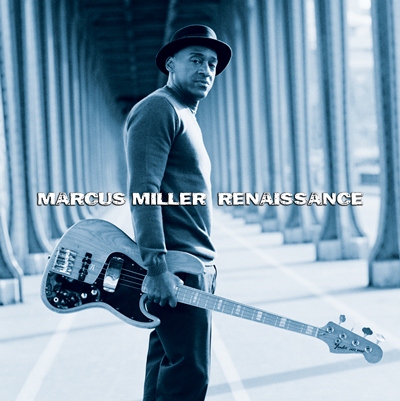Marcus Miller | Renaissance
Marcus Miller
Renaissance
(PRA)
By A. Scott Galloway
Since the release of his third solo album The Sun Don’t Lie in 1993, Marcus Miller has etched out a slammin’ formula for record making: outstanding showcases for bass taking its rightful place next to sax, trumpet and guitar as a foreground instrument, instrumental compositions that send one’s imagination on a journey, stellar guest vocal turns, and passionate arrangements of others’ hits done with bold singularity and respect. All of that remains intact for Renaissance, Miller’s eighth official studio album of new material as a leader. Additionally, in writing for a hungry new band of young lions, Marcus has tapped a deeper fathom of compositional inspiration on key numbers that is downright astounding considering that this is a man who has already contributed such indelible pieces as Miles Davis’ last classic “Tutu” and Bob James & David Sanborn’s radio staple “Maputo.” Clearly, the weight of mentorship is reflecting in his art as well.
The album opens familiar enough with a pair of supple melodic funk nuggets “Detroit” and “Redemption.” But the first of several next level compositions arrives third in the bittersweet beauty of “February.” A pair of covers couldn’t be more night and day. First, WAR’s “Slippin’ into Darkness” gets a frontline jazz quintet horn arrangement that gives way to a bass solo from Marcus that packs an Ali-worthy punch to the gut. Second is a transcendent take on Ivan Lins’ timeless “Setembro,” made famous by Quincy Jones featuring elastic vocal sextet Take 6 in 1989. Miller takes that story (subtitled “Brazilian Wedding Song”) and blesses it with heavenly fretless bass melody, the dancing improvised vocal lines of Gretchen Parlato plus a new hook in Spanish sung by Panamanian music ambassador Ruben Blades.
The mid-section of the album truly finds Miller stretching in the compositional department with the fat boppin’ dual personality funk-rock of “Jekyll & Hyde” followed by the cinematic “Revelation” featuring deeply dynamic showcases for Alex Han on alto sax and Adam Agati on electric guitar. (Note: the intro was lifted from the piece “Nocturnal Mist” composed by Mano Hanes for inspirational music giant Israel Haughton). Miller lightens things up a taste with the densely funky throwback “Mr. Clean” penned by one of his `70s mentors, the late great Weldon Irvine. This sets up the album’s deepest piece of all, “Goree” (pronounced Go-ray), a highly emotional composition inspired by a tour stop to the African island where Black men and women were warehoused before being shipped abroad as slaves. Marcus brings out his other signature instrument, the bass clarinet, on this treacherous yet ultimately hope-filled musical sojourn. This piece should surely be headed for award-winning territory for writing and solos. Miller rebounds from this masterpiece with a `70s-era blowing session titled “CEE-TEE-EYE” in tribute to the expansive groove jazz recorded on CTI Records such as Freddie Hubbard’s “Red Clay.” Dig trumpeter Maurice Brown takin’ it to the ozone here.
Renaissance closes with the spiritual rewards of the jubilant “Tightrope,” Janelle Monae’s 2010 soul-pop smash given a New Orleans lift by native son Dr. John, followed by a poignant overdubbed solo bass turn on The Jackson 5’s “I’ll Be There” played with the reverence of a man who first heard it at the age of 11when it came out in 1971 and has been loving it ever since.
Marcus Miller’s Renaissance is easily among the best and most important albums of 2012 in any genre. This project marks a master entering new frontier status in his skills as a composer, arranger and band leader… profoundly inspired music you’ll be plunging into and pondering upon for years to come.
A. Scott Galloway
Music Editor
The Urban Music Scene
